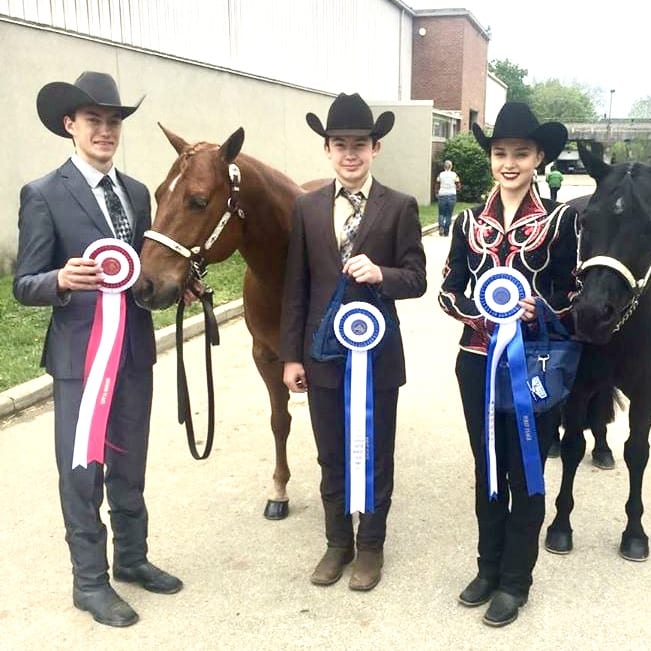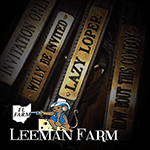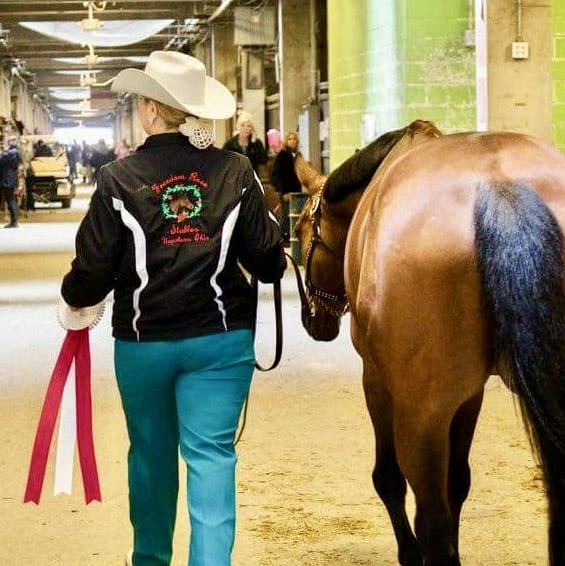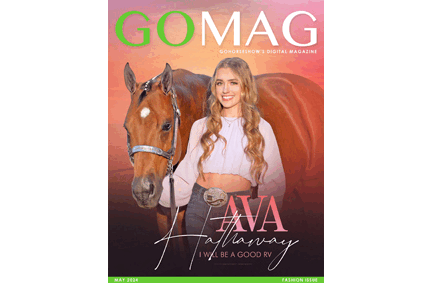There’s a reason the All American Youth Horse Show (AAYHS) is commonly referred to as the “Kiddie Congress.” In its 50th year, it boasts more than 4,000 entries, spans four days and requires six qualified judges working in up to four arenas. But it’s not a Congress – it’s an open show. Yes, you read that right, an open show.
What began in 1968 as a fundraiser to improve the buildings at the Franklin County, Ohio fairgrounds, has grown into a Congress-like experience that exhibitors 18 and under flock to from as far away as Georgia and South Dakota.
Looking around at this open show is quite like looking around at other big name shows – folks milling around a large vendor area, golf carts zipping from place to place, the order of go’s posted and high-quality horses and exhibitors hoping for their best runs.
So, in a time when some horse shows are quietly disappearing and those that remain often struggle to make money, what is the AAYHS’s key to success?
AAYHS board member and multiple carded judge, Daren Wright offered insight on five critical factors that keep exhibitors coming back for more.
Offer classes that span the spectrum
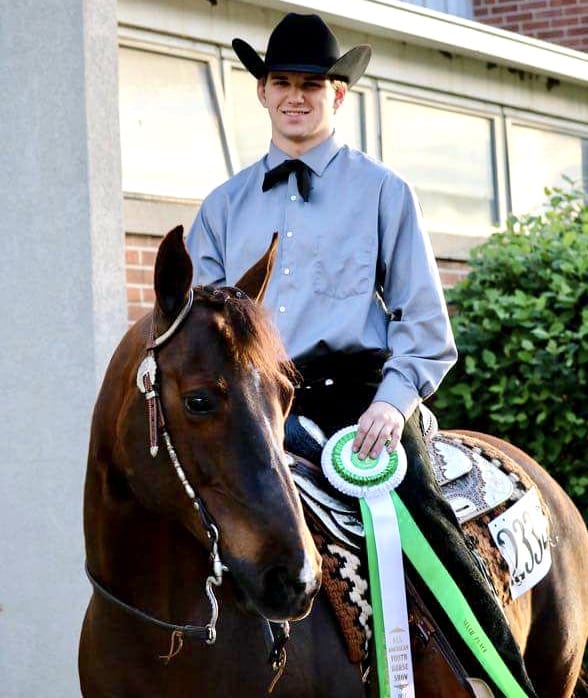 Many shows use the same show bill that offers basic classes year after year. Wright credits part of the AAYHS’s success to offering a wider variety of classes than most shows. “Part of the attractiveness of our show is we are happy to have and accept any horse you have. If you can ride it and get it in a trailer, we probably have a class for you,” Wright says.
Many shows use the same show bill that offers basic classes year after year. Wright credits part of the AAYHS’s success to offering a wider variety of classes than most shows. “Part of the attractiveness of our show is we are happy to have and accept any horse you have. If you can ride it and get it in a trailer, we probably have a class for you,” Wright says.
While most of the horses shown there are stock type; they have had gaited horses, mules and a variety of ponies including Norwegian Fjords, Haflingers and Gypsy Vanners. There have been enough mini’s entered that this year, the show will offer classes specifically for them.
In addition to the classes you see on most show bills like showmanship and halter, equitation and pleasure, this show offers other opportunities including contesting, driving, reining, western riding, trail, over fences and classes for equestrians with disabilities. This year, exhibitors will have opportunities to enjoy fun classes like egg and spoon and ride-a-buck.
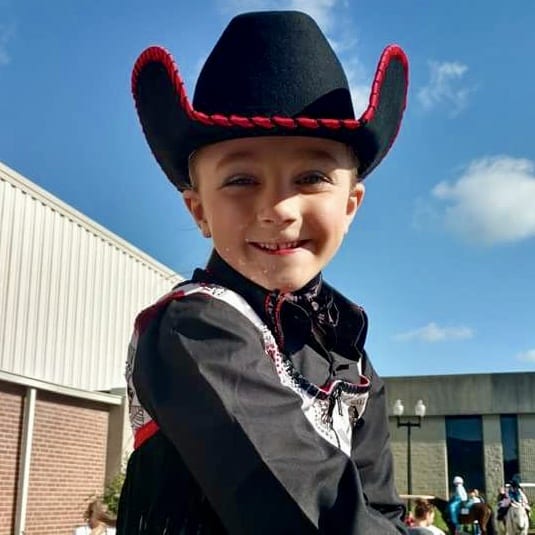 Additionally, many classes are broken down by age and not in grouped ages like most shows. The classes they run by age group (13&U and 14-18) are contest, pony, mini and trail. The other classes break down each age group; there is a showmanship class for 18-year-olds, one for 17-year-olds, another for 16-year-olds, you get the idea. The top two exhibitors from each category are then called back into a championship.
Additionally, many classes are broken down by age and not in grouped ages like most shows. The classes they run by age group (13&U and 14-18) are contest, pony, mini and trail. The other classes break down each age group; there is a showmanship class for 18-year-olds, one for 17-year-olds, another for 16-year-olds, you get the idea. The top two exhibitors from each category are then called back into a championship.
For open shows that are watching their profits dwindle, it’s important to remember that offering a new class – even if it only has one entry – is one more entry than the show would have had without it. To up a class’ numbers, it may help to incentivize the class somehow – by adding it to a high point contest or offering a unique prize – or ask the judge to explain class expectations and judging criteria if it’s new to most exhibitors.
Keep in mind what’s important to exhibitors
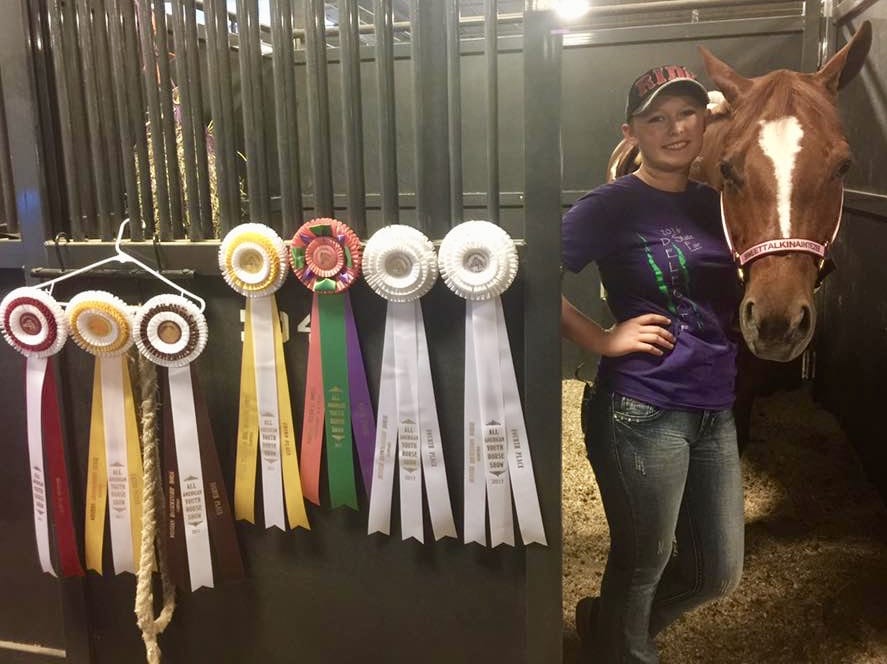 Ask any seasoned exhibitor what they most looked forward to at the start of their show career as a youth and the answer will likely be similar across the board – pretty ribbons and sparkling trophies. Often, show committees don’t have a youth member to remind the adults of that; otherwise, committee members can’t justify spending money on expensive prizes when the show barely eeks out of the red the way it is. But Wright cannot emphasize enough how essential awards are for exhibitors, saying that it’s the awards that have kept the AAYHS show alive and growing.
Ask any seasoned exhibitor what they most looked forward to at the start of their show career as a youth and the answer will likely be similar across the board – pretty ribbons and sparkling trophies. Often, show committees don’t have a youth member to remind the adults of that; otherwise, committee members can’t justify spending money on expensive prizes when the show barely eeks out of the red the way it is. But Wright cannot emphasize enough how essential awards are for exhibitors, saying that it’s the awards that have kept the AAYHS show alive and growing.
“Exhibitors don’t come to our show for money or points; they come to the show for the honor of winning one of those three-foot ribbons,” Wright says. “The idea of getting their name called and getting presented that ribbon in the center of the arena in front of everyone is what they want. I feel some of that fanfare has been left out at a lot of shows. Going to the office to pick up your red cup, if you happen to remember, does not have the same effect as getting a large ribbon presented to you in the middle of the arena.”
In addition to terrific ribbons, first place winners receive prizes they’ll find use for over and over – including equipment bags, garment bags, training cones, saddle pads, hat cans, grooming bags and halters. Grand and reserve champions win coolers, boots, photography packages, show equipment, barn equipment, clippers or wheelbarrows. The committee works hard to have such prizes sponsored and then embroidered or embossed with the sponsor’s name.
Goals for horse show attendees differ, but it’s safe to say most all exhibitors, regardless of level, seek to improve from show-to-show. One successful addition to the AAHYS show that Wright has heard rave reviews about has been a “Ride the Pattern” demonstration. He explains that the night before show day, show judges meet in one arena and go over the pattern, explaining how the pattern should be laid out and how the exhibitors should approach it to get top scores. “It is always very well-attended and exhibitors leave knowing what is expected of them throughout the show,” Wright says.
Foster a friendly atmosphere
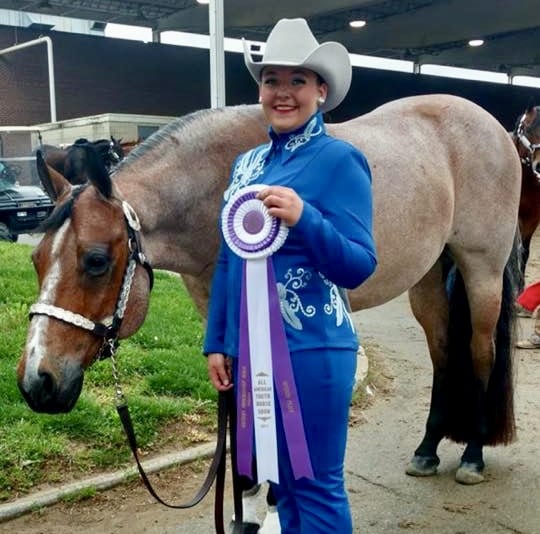 Show committees should always remember that horse showing is exhausting and expensive, but each exhibitor is there despite that to pursue their passion and have fun. For that reason, Wright’s most significant piece of advice for show managers is not to forget to make the experience special for the exhibitor. “Some of your exhibitors are going to be old pros while others are just getting started. If each one doesn’t feel special, welcomed or are not having fun, they will find another hobby,” Wright says. Keep the atmosphere welcoming but professional by considering show volunteers’ strengths and personalities and placing them in positions that will help them and exhibitors feel successful. And, of course, offer genuine thanks to each exhibitor, show volunteer, show mom or dad and spectator for patronizing your show.
Show committees should always remember that horse showing is exhausting and expensive, but each exhibitor is there despite that to pursue their passion and have fun. For that reason, Wright’s most significant piece of advice for show managers is not to forget to make the experience special for the exhibitor. “Some of your exhibitors are going to be old pros while others are just getting started. If each one doesn’t feel special, welcomed or are not having fun, they will find another hobby,” Wright says. Keep the atmosphere welcoming but professional by considering show volunteers’ strengths and personalities and placing them in positions that will help them and exhibitors feel successful. And, of course, offer genuine thanks to each exhibitor, show volunteer, show mom or dad and spectator for patronizing your show.
Hire good judges
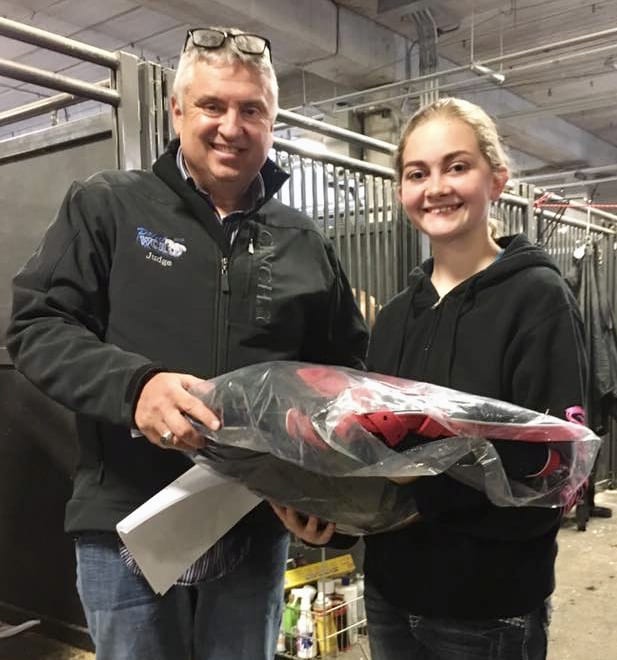 “Being a judge myself, I understand the importance of having judges that are the top of their game officiating such a large show,” Wright says. “For our main arenas, we typically hire AQHA judges. Our past judges have officiated all over the world, AQHA and APHA World Shows and The All American Quarter Horse Congress.”
“Being a judge myself, I understand the importance of having judges that are the top of their game officiating such a large show,” Wright says. “For our main arenas, we typically hire AQHA judges. Our past judges have officiated all over the world, AQHA and APHA World Shows and The All American Quarter Horse Congress.”
Hiring judges of that caliber may not be realistic for all shows, however. In that case, show committees should seek seasoned judges with strong reputations. Some of the most untapped resources in judge expertise are other show managers who run successful shows. Another idea is to ask a judge who you’ve enjoyed showing under who they may recommend.
Show managers should not be afraid of asking judges questions about their philosophies, their experience, their willingness to speak with exhibitors throughout the day to help them improve and the specific qualities they may have that might match the show’s goals. So, if you’re hosting a youth show, find judges who are good at and willing to work with kids positively.
Your show may not grow to 4,000 entries overnight, but perhaps becoming the “Kiddie Congress” of your area isn’t as far off as you think if you take a lesson from the AAHYS.
About the author: When she isn’t wrangling 12 and 13 year-olds in her middle school English classroom, Megan Ulrich enjoys riding, showing and judging horses. She lives in Holmen, Wisc., with her husband, daughter, two dogs and two horses. She earned her journalism degree from the University of Wisconsin-Madison.


